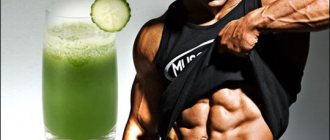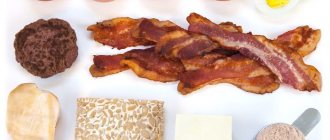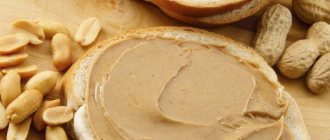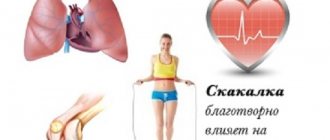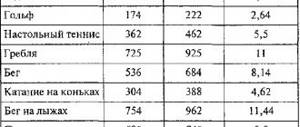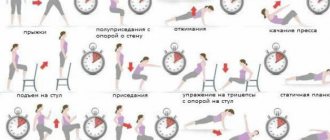As you know, daily consumption of protein is necessary to maintain health and proper functioning of the body. And if you want to lose weight, build muscle, improve your appearance or improve your body's performance, protein (and the amount of it) becomes even more important.
Now that you know why it is needed, the question arises “how much?” More precisely, how much protein your body needs to achieve a specific goal.
So let's answer the question...
How much protein should a person eat per day?
Surprisingly, according to generally accepted recommendations, the amount of protein you need to eat per day to improve your body is almost the same for different people.
For most, the ideal daily protein intake is: 1.6-3.0 g per kg of body weight.
Of course, this range is quite wide. Here are tips on how to narrow it down to what's right for you.
Recommended amount of protein per day based on baseline fitness and goals
| Man, his physical form and goals | Ideal Daily Protein Intake |
| The average healthy adult (male or female) who lives a mostly sedentary lifestyle and does little or no exercise. This is the minimum daily amount of protein to maintain overall health/function of the body. | 1,0-1,4 g protein per kg body weight. |
| The average healthy adult (male or female) who regularly engages in low-intensity exercise or is trying to improve their body (lose weight, build muscle, etc.). This is the minimum recommended amount. | 1,6-2,0 g protein per kg body weight. |
| The average healthy adult woman , whose main goal is to build muscle mass, make the muscles more prominent and “dry”, increase endurance or performance. | 2,0-2,4 g protein per kg body weight. |
| The average healthy adult male , whose main goal is to build muscle mass, make the muscles more prominent and “dry”, increase endurance or performance. | 2,0-3,0 g protein per kg body weight. |
If you're still in doubt, the generally accepted recommendation of 2g protein per kg of body weight, which has reigned in the fitness world for decades, is an average protein intake that is sufficient for most people.
So, to find out how much protein you need each day, you should multiply your current body weight (in kilograms) by the amount of protein recommended in the table above.
Here are 2 examples:
- A woman weighing 65 kg who wants to pump up muscles, make them more prominent or get rid of excess fat (while maintaining muscle mass) should multiply 65 by 2.0-2.4. The daily protein intake in her case will be about 130-156 g per day.
- A 200-pound man who wants to increase muscle size, maintain muscle while losing weight, or improve endurance/performance should multiply 90 by 2.0 to 3.0. The daily protein intake in his case will be about 180-270 g per day.
To put it even easier, multiply your current body weight in kilograms by a generally accepted figure.
This will give you a range of how much protein you should consume per day. Did you count? Amazing! Now we have figured out your daily protein requirement.
*Note*
For overweight people, the ideal amount of protein when calculated using current body weight will be higher due to excess fat. Therefore, for those who are obese, a target body weight should be used. For example, a person weighing 150 kg, wanting to lose weight to 100, should use a weight of 100 kg in calculating daily requirements.
As long as you stay within this "ideal" range, your protein intake will meet your needs, resulting in the best results possible.
The next thing you need to know is a list of foods that should be present in your diet every day.
Protein Power
These results aren't earth-shattering, but they do confirm what you already know: when women, especially those who exercise actively, eat more protein, they gain more muscle mass compared to those on a low-protein diet.
But here's the surprise: Women in the high-protein group averaged 423 extra calories from protein. You and I thought that if we took in 400-500 more calories per day for 8 weeks, we would gain fat, but it turned out that this is not so!
Women on the high protein diet lost more fat mass than women on the low protein diet, even though they ate more calories! The high protein group lost an average of 1.08 kg of fat, while the low protein group lost 0.7 kg of fat.
We have seen the same thing in previous studies conducted on men or mixed groups. Eating an extra 500-750 calories from protein per day will not lead to fat gain.
In light of these results, it can be said that women are more responsive to protein intake than men. However, this is still only a theory, and more research is needed.
Examples of High Protein Foods
Below is a short, basic list of the most common high protein foods:
- Chicken (without skin);
- Turkey (without skin);
- Fish (all types);
- Beef (lean);
- Pork (lean);
- Whole eggs;
- Egg white;
- Protein supplements (whey protein powder, casein powder, protein bars, etc.);
- Legumes (all types);
- Nuts (all types);
- Milk;
- Cheese.
This is not a complete list of foods that contain protein, but any of them will cover most of your needs. Just choose the ones you like the most.
The importance of protein intake for the body
The amount of protein you consume per day is of great importance for your health. Protein is important for metabolism and the production of enzymes, antibodies, and other cells and compounds that keep the body functioning properly.
The daily protein intake provides the body with the necessary amount of amino acids for:
- regulation of metabolism;
- maintaining skin, nails, hair, blood vessels in good condition;
- proper development of muscle tissue;
- antibody production;
- digestion of food.
It is important to consider that proteins do not accumulate in the body in reserve, unlike carbohydrates and fats. For this reason, their lack in the diet, as well as their excess, immediately affects health.
In addition, protein, along with substances such as water and glycogen, helps to gain muscle mass and maintain it at the required level, which is important for athletes and bodybuilders.
Protein is also an important factor in losing weight. The feeling of hunger creates enormous difficulties when following a diet. Protein is a fairly filling macronutrient, so consuming it in sufficient quantities allows you to maintain a feeling of fullness and satisfaction, without the need to endure hunger while dieting.
Protein increases your metabolic rate, which is the number of calories burned during the day. The thermic effect that protein has is the strongest compared to carbohydrates, increasing the number of calories burned during food digestion by up to 30%. That is, when you consume 100 calories from protein, 30% of them are burned during digestion. This is why high protein diets are so effective.
What does a lack of protein lead to?
When losing weight, it is important to eat right and maintain the required amount of protein, otherwise you will lose weight not due to fat, but due to muscles. A lack of protein in the diet can lead to pathologies associated with hormonal imbalance, and nutritional dystrophy may develop. In addition, the thought process is disrupted, and the functioning of the circulatory system and liver deteriorates.
Other consequences of protein deficiency include:
- Frequent illnesses. Protein is essential for the functioning of the immune system. If there is a lack of it, the cells necessary to successfully fight harmful bacteria are not produced in sufficient quantities. As a result, the immune system copes worse with the infection.
- Weak hair and nails. With a lack of protein, hair loses its shine and splits, and nails become brittle.
- Slow healing of wounds and cuts.
- Swelling and a feeling of heaviness in the legs and whole body.
- Bad mood. Protein is important for the synthesis of serotonin, which is responsible for stress resistance. A lack of serotonin can lead to insomnia, blues, irritability, anxiety and depression.
- General weakness, fatigue.
Excess protein can also lead to significant health problems. These include:
- Constant feeling of thirst. An excess of proteins puts a strain on the kidneys, and a large amount of fluid is required in order to remove excess substances from the body.
- Digestive problems. Due to an excess of proteins, the intestinal microflora suffers, which also leads to diarrhea and bloating.
- Hormonal disbalance. This is especially true for women, since a certain amount of fat must be present in the female body. A lack of carbohydrates and an excess of protein lead to hormonal imbalances and menstrual irregularities.
- Bad breath.
- Liver overload. Due to the large amount of toxins, it increases in size. Blood filtration becomes difficult, causing harmful substances to accumulate in the vessels, impeding blood flow.
- Atherosclerosis. Athletes who use too much protein to build muscle mass are especially susceptible to this disease.
What is protein and why is it so important?
Have you considered how much protein you eat daily? And is this amount enough for you? Few people think about how much protein per 1 kg of weight is needed by an ordinary person. According to WHO, 95% of the inhabitants of our planet have protein deficiency, this also applies to residents of civilized countries.
Protein should be consumed every day in the required quantities, because its deficiency causes many health problems. And consuming protein when losing weight is simply necessary, so now we will look at how much of it you need to eat and how.
First, let's remember what protein is. Any protein is made from a combination of 20 amino acids, compounds that help build muscle, renew skin cells, and control hunger. Eleven of these acids are optional, since the body can produce them itself; they do not need to be obtained from food. The remaining nine are required. They are not produced by the body and must be replenished regularly.
Complete proteins contain all nine essential amino acids and are found in meat, fish, dairy products, eggs, beans and quinoa.
Incomplete, as the name suggests, does not contain all the necessary amino acids. Foods containing such proteins include nuts, seeds, grains, legumes, fruits and vegetables. All of the foods listed are missing one or more essential amino acids, although each one is different. Therefore, if you add up all the above products, you can potentially get the entire set of necessary amino acids.
All our organs, muscles, tissues are made of protein. Our body uses it for proper functioning and growth. With a lack of protein, a person begins to feel unwell, not understanding what is wrong. Although the reason is so banal - protein deficiency, and you just need to think about how much protein you need per 1 kg of weight.
Protein in the diet not only helps get rid of subcutaneous fat, but also prevents its appearance, stabilizes blood sugar levels, strengthens bones, improves memory, helps to concentrate better, improves skin and hair condition, increases energy levels, and supports fast metabolism.
Best Sources of Protein
To intensively gain muscle mass and burn fat, it is not necessary to drink protein in the form of sports supplements. It is also found in certain natural products.
The main criterion in the selection of food products with protein content is the coefficient of its absorption and the quantitative indicator per calorie. The best option would be food rich in protein and low in fat.
Proteins that have undergone heat treatment are better digested. But it should be borne in mind that in this case amino acids are destroyed and the biological value of the protein decreases. The nutritional content also depends on how the food is stored.
Most of the important components in foods are lost during repeated freezing.
Products leading in protein content:
- all varieties of fish;
- chicken meat;
- pork and beef;
- eggs;
- legumes: beans, peas;
- nuts;
- milk;
- cottage cheese;
- cheeses.
Sports nutrition includes: whey protein powder, casein powder, protein chocolates.
The attached instructions for protein supplements contain all the necessary information: protein source, method of preparation, nutritional value, amount of vitamins and minerals. Taking this into account, you can independently select the product and dosage, in accordance with the nature of your training.
Athletes are recommended to create a diet so that half of the protein comes from natural products, the rest from sports supplements. In financial terms, artificial protein is no more expensive than a standard protein food set.
Protein formulations consist of 90% protein, so there are minimal foreign inclusions. An additional advantage of the mixtures is the presence of important vitamins and microelements.
